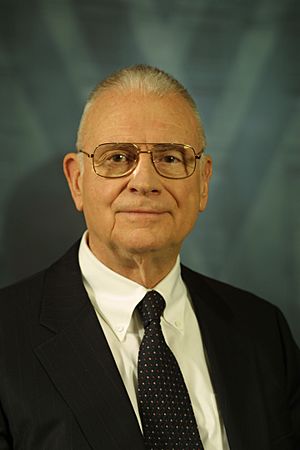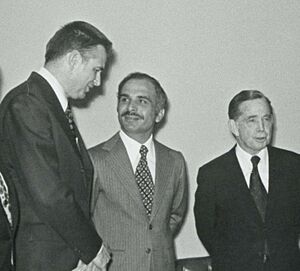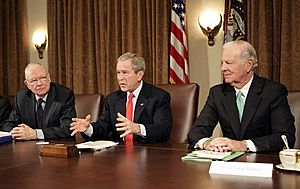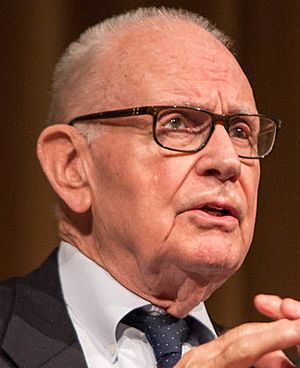Lee Hamilton facts for kids
Quick facts for kids
Lee Hamilton
|
|
|---|---|

Official portrait for the 9/11 Commission
|
|
| Vice Chair of the 9/11 Commission | |
| In office December 11, 2002 – August 21, 2004 |
|
| President | George W. Bush |
| Preceded by | George J. Mitchell |
| Succeeded by | Position abolished |
| Chair of the House Foreign Affairs Committee | |
| In office January 3, 1993 – January 3, 1995 |
|
| Preceded by | Dante Fascell |
| Succeeded by | Benjamin Gilman |
| Chair of the House Intelligence Committee | |
| In office January 3, 1985 – January 3, 1987 |
|
| Preceded by | Edward Boland |
| Succeeded by | Louis Stokes |
| Member of the U.S. House of Representatives from Indiana's 9th district |
|
| In office January 3, 1965 – January 3, 1999 |
|
| Preceded by | Earl Wilson |
| Succeeded by | Baron Hill |
| Personal details | |
| Born |
Lee Herbert Hamilton
April 20, 1931 Daytona Beach, Florida, U.S. |
| Died | February 3, 2026 (aged 94) Bloomington, Indiana, U.S. |
| Political party | Democratic |
| Spouse |
Nancy Nelson
(m. 1954; died 2012) |
| Children | 3 |
| Education | DePauw University (BA) Indiana University, Bloomington (JD) |
| Awards | Presidential Medal of Freedom |
Lee Herbert Hamilton (April 20, 1931 – February 3, 2026) was an important American politician and lawyer from Indiana. He served for many years in the United States House of Representatives. After his time in Congress, he became well-known as the vice chairman of the 9/11 Commission. This commission investigated the terrorist attacks of September 11, 2001.
Contents
Early Life and Education
Lee Hamilton was born in Daytona Beach, Florida, on April 20, 1931. He grew up in Evansville, Indiana. He went to public schools and graduated from Evansville Central High School in 1948.
He was a talented basketball player. He led his high school team to the state championship game. He continued playing basketball at DePauw University. Lee Hamilton earned his degree from DePauw in 1952. Later, he graduated from the Indiana University School of Law in 1956. For the next ten years, he worked as a lawyer in Columbus, Indiana.
Serving in Congress
In 1964, Lee Hamilton was elected to the United States House of Representatives. He was a member of the Democratic Party. He represented the 9th congressional district of Indiana.
During his long career in Congress, he led several important committees. These included the House Foreign Affairs Committee. He also chaired the House Intelligence Committee. He worked in Congress from 1965 until 1999. He was known for his knowledge of foreign policy.
Important Work After Congress
After leaving Congress in 1999, Lee Hamilton continued to serve the country. In 2002, President George W. Bush chose him for a very important role. He became the vice-chairman of the 9/11 Commission. This group investigated the terrible terrorist attacks that happened on September 11, 2001. Their work helped the country understand what happened and how to prevent future attacks.
In 2006, he co-chaired the Iraq Study Group. This group gave advice on the situation in Iraq. He also served on many other advisory boards. These included boards for the CIA and the President's Homeland Security Advisory Council.
Lee Hamilton also wrote a book in 2004. It was called "How Congress Works and Why You Should Care." In this book, he explained how Congress functions. He also shared his ideas on how to make it better. He wanted to help everyday Americans understand their government.
In 2011, he wrote a letter to President Barack Obama. He asked for a reduced prison sentence for a person. He believed the sentence was too harsh. He felt it was a matter of compassion and justice.
Personal Life and Family
Lee Hamilton married Nancy Nelson in 1954. They had three children together. Nancy Hamilton was an accomplished artist. Her oil paintings and watercolors were shown in exhibits. She also volunteered thousands of hours at a hospital. Nancy passed away in 2012 after an accident.
Lee Hamilton passed away in Bloomington, Indiana, on February 3, 2026. He was 94 years old.
Awards and Recognitions
Lee Hamilton received many honors for his public service.
- In 1999, a nine-mile stretch of highway in Indiana was named the "Lee H. Hamilton Highway." This was in his former congressional district.
- In 1982, he was inducted into the Indiana Basketball Hall of Fame. This honored his excellent high school basketball career. He led his team to several deep runs in state tournaments.
- In 2001, he received the Lifetime Contributions to American Diplomacy Award. This was from the American Foreign Service Association.
- In 2005, he earned the U.S. Senator John Heinz Award for Public Service.
- In 2011, he received the Benjamin Harrison Presidential Site Advancing American Democracy Award.
- In November 2015, President Barack Obama awarded him the Presidential Medal of Freedom. This is one of the highest civilian honors in the United States.
- In 2018, Indiana University Bloomington honored him. They renamed their School of Global and International Studies after him. It is now called the Hamilton Lugar School.
 | Lonnie Johnson |
 | Granville Woods |
 | Lewis Howard Latimer |
 | James West |




